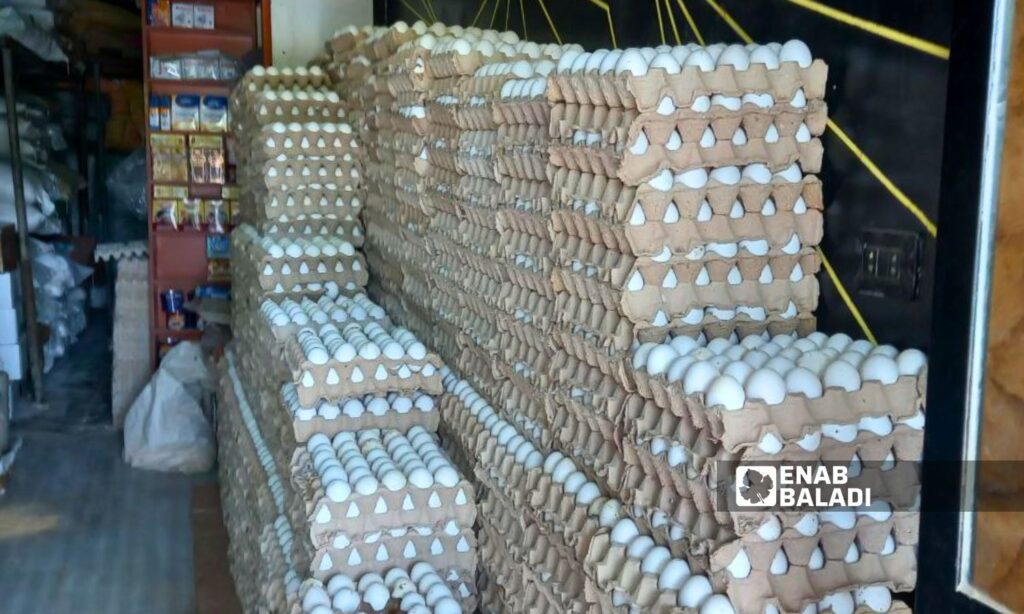Egg prices in Daraa, southern Syria, have dropped by more than 50%, bringing the price of a tray (30 eggs weighing two kilograms) down to 35,000 Syrian pounds.
Egg prices recorded peak levels during the winter season, reaching 65,000 Syrian pounds in January and February before starting to decrease at the beginning of April.
The exchange rate of the dollar is 14,700 Syrian pounds, according to the S-P Today website specialized in currency rates.
Increased supply reduces prices
The decrease in prices can be traced back to an oversupply of eggs in the local market, with no external market for the product.
Ali al-Mufalani, a wholesale egg merchant in the eastern countryside of Daraa, attributed the price drop to the basic supply and demand dynamics of the commodity.
He told Enab Baladi that with the onset of spring, the quantities of eggs available in the local market increased, whereas production was lower in winter due to colder weather and the costs of breeding and heating.
He added that with the beginning of spring, new places for poultry were opened entering the production phase in early April, which flooded the market with the commodity, leading to a drop in prices.
Mohammed al-Miqdad, a breeder from the eastern countryside of Daraa, believes that the reason for the price drop is the production of large quantities of small-sized eggs, resulting from the production of new chickens.
He added that the outlet for production is the local market, as there is no export of eggs due to their price being similar to that in neighboring countries.
He noted that breeding costs increase in the winter due to heating, which is not required in the summer.
Mohammed Khair Lahham, the Director of Animal Production at the Syrian Ministry of Agriculture, stated to the Tishreen government newspaper, that the reason for the drop in the price of table eggs is the increase in the number of production batches.
The market also witnessed a spread of small-sized eggs due to the emergence of new production batches.
Meanwhile, Bassam al-Hashish, the Director of Agriculture in Daraa, attributed the price drop to several factors, the first being the provision of production inputs such as feed and fuels at a subsidized price, which included licensed and unlicensed poultry farms as per the visual inspection conducted by the directorate.
He added that fuel subsidies now cover the entire needs of breeding, not just 20% as before.
In January, the Syrian Company for the Storage and Distribution of Petroleum Materials announced raising the price of diesel for poultry from 2,000 Syrian pounds to 8,000 Syrian pounds per liter.
Regarding the support of the poultry sector with feed, al-Hashish said that the availability of large quantities of local corn after securing corn dryers in Hama and Aleppo governorates contributed to breaking feed prices.
This is considering that corn is a main component in the poultry feed mix.
Whereas breeders met by Enab Baladi said that the General Corporation for Feed offered them corn, soy, and bran at a price exceeding the market price by 500 to 1,000 Syrian pounds per kilo.
Last year, it was delivered at a price reduced by 500 Syrian pounds per kilo.
According to the Director of Agriculture in Daraa, there are 250 licensed and unlicensed egg poultry farms in Daraa province.
Eggs return to the tables of residents
The decrease in prices has encouraged the residents of Daraa to buy eggs, taking advantage of the low price.
Ahmad, a seller in a foodstuff shop in the western countryside of Daraa, said that egg sales experienced a slowdown during the winter months before improving with the price drop.
He added that he sells about five trays a day, while he did not exceed selling one tray during the winter.
Meanwhile, Khaled Nahar (38 years old) said that eggs have returned to his family’s breakfast table on most days, and he did not buy them previously due to their high prices.
Nahar works on daily wages earning 30,000 Syrian pounds a day.
Syria is experiencing a deterioration in its economic and living conditions, which negatively affects all aspects of life.
The general level of prices experiences repeated increases affecting a range of goods, basic materials, and food items, further increasing the difficulties for residents to afford purchases.

